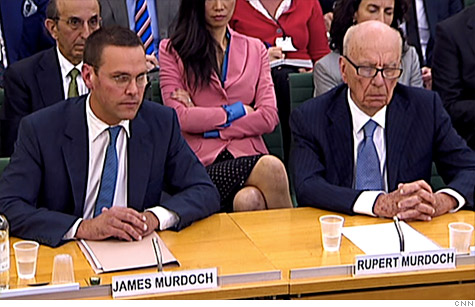Search News

The phone-hacking scandal engulfing James and Rupert Murdoch, who control 40% of News Corp., could affect their FCC license, but only if there's a conviction in the U.S.
NEW YORK (CNNMoney) -- Will the fallout from the Murdochs' phone-hacking scandal in the United Kingdom cross the Atlantic and impede News Corp.'s ability to broadcast in the United States?
It's an unlikely scenario, analysts say, but it could happen. It all depends on the legal outcome of allegations of hacking in the U.S. related to the now-defunct British newspaper News of the World.
"I don't think it's a probability, but I think it's a realistic possibility," said David Gurwin, chairman of the entertainment and media law group and the technology transactions group at Buchanan Ingersoll & Rooney.
The News Corp. (NWS) scandal reached new heights on Tuesday, when Chief Executive Rupert Murdoch and his son James, who control about 40% of the $60 billion corporation, testified before the British Parliament about allegations of phone hacking.
This was after the Murdochs shut down their 168-year-old News of the World newspaper, one of the most widely read in the English language. In closing the paper, the Murdochs hoped to alleviate accusations of illegal hacking into phone voice mails of a missing teenage girl who was later found murdered, and the father of a victim of the London terrorist bombings in 2005.
British police are investigating the possibility that thousands of voice-mail accounts may have been hacked by people affiliated with News International, the News Corp. subsidiary that published News of the World. As part of this investigation, police arrested -- but did not charge -- Rebekah Brooks, former News of the World editor who recently quit her chief executive job at News International.
In addition, Scotland Yard is investigating allegations that some of its officers may have accepted bribes from News of the World.
News Corp. (NWSA, Fortune 500) is also under legal scrutiny in the U.S. The FBI is investigating News Corp. over allegations that News of the World staff hacked into voice mails of victims of the Sept. 11, 2001 terrorist attacks. Rupert Murdoch denied these allegations during his testimony before Parliament.
But it's not just about Britain. The fact that the allegations involved U.S. victims makes the scandal relevant to America and, therefore, to the Federal Communications Commission.
Part of the FCC's basis for awarding licenses is the character of the licensee. This character could come under question in the event of a felony conviction, according to analysts, and it could affect the licensing of Fox affiliates in the U.S.
"It is possible that if News International was found to have bribed police officers, or if there [were convictions related to the phone hacking] that the FCC would be able to review the good character test of the organization," said British media analyst Claire Enders of Enders Analysis Ltd.
News Corp.'s newspapers include such prominent titles as The Sun and The Times in Britain, and the New York Post and The Wall Street Journal in the U.S. But newspapers make up just a small part of the Murdoch empire, contributing a mere 3% of total profits.
Broadcasting is the company's true bread and butter, particularly in the U.S., where News Corp. broadcasts Fox news and Fox cable channels, as well as local affiliates. Television makes up 18% of News Corp. profits, while the majority of income -- some 69% - comes from cable network programming.
The FCC can revoke a broadcast license if the government agency decides that the broadcaster fails the test of character. More likely, the FCC might decide to not renew a license when the term runs out, if the licensee has been convicted of a crime in the U.S.
"To the extent that these allegations are true, it would probably be taken into consideration at least when these renewals are coming up," said Buchanan Ingersoll's Gurwin.
FCC broadcast licenses typically last eight years.
Analysts said revoking an FCC license from News Corp. is a distant possibility, and that if it does occur, it would happen only after a conviction following an investigation that would likely drag on for years.
Enders said the process could be lengthened still further by appeals. "This is a very remote and nebulous scenario," she said.
During a House Energy and Commerce Committee hearing last week, FCC Chairman Julius Genachowski said phone hacking should be "addressed seriously" and investigated. But during a separate meeting with the FCC, when he was asked about the News Corp. scandal, he said, "There is a process going on in the U.K., and that is a U.K. process and I don't expect we will be involved in that."
Agata Kaczanowska, broadcast analyst for IBISWorld, agreed that the legal fallout from News of the World will most likely be limited to the News International part of News Corp.
"So long as the owner/operators' (e.g. Rupert or James Murdoch's) names are kept clear, the legal ramifications should not affect the company's licenses within the United States," she said, in an email to CNNMoney.
Representatives of News Corp. did not respond to requests for comment from CNNMoney. ![]()